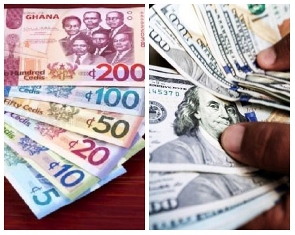Quite recently, Ghanaians have been witnessing rapid depreciation of the national currency, the cedi, against the major trading currencies such as the USD, GBP, and the EUR. This is a disturbing phenomenon. So far no concrete solution has been offered to ameliorate the suffering of Ghanaians. We sometimes hear the Bank of Ghana saying they are going to inject some billions of foreign currency, especially the USD into the economy, but it is quite clear this measure has not solved or reduced to the barest minimum the rapid depreciation of the cedi we are recently experiencing. From the theoretical perspective, the rapid depreciation of the cedi is due to the fact that Ghanaians have subtly created a ‘commodity’ called USD (let’s assume USD represents all traded foreign currencies). This commodity in itself has no value but its value stems from the fact it can be exchanged for goods and services which are consumed to satisfy human wants. This is referred to as the intrinsic value of money. It is a mere piece of paper with various inscriptions on it. Ghanaians have given more value to this piece of paper that today: Some landlord demand for rent payment in it; Car dealers sell their cars in it; Hotels bills are settled in it; Ghanaian lands are traded in it; School fees are paid in it; Residential properties located in Ghana are traded in it; Some make funeral donations in it; Others carry it in their pockets as a status symbol. Interestingly the above transactions are domestic and have largely no international dimension. In sum, we have created a huge demand for a ‘commodity’ that is in short supply, and therefore naturally as economic theory tells us, the price of the ‘commodity’, which in this case is the exchange rate, will rise. So how do we reduce the dollarization of the Ghanaian economy in order to shore up the value of the cedi against the major trading currencies? I offer the following recommendations to the Government of the Republic of Ghana. 1. Bank of Ghana should immediately put a temporal freeze on cash deposits into all forex accounts domiciled with commercial banks. Forex accounts are accounts into which hard foreign currencies (cash) are deposited. Foreign inflow can also be paid into forex accounts. Foreign accounts are different from forex accounts. Foreign accounts are fed with only inflows from abroad. The temporal freeze will ensure that USD obtained from the black markets does not find its way into the banking system. 2. Bank of Ghana should ban forex trading for domestic transactions. Forex trading should be allowed only for international transactions. Bank of Ghana already has regulations concerning repatriation of foreign currencies. 3. Bank of Ghana should allow the opening of forex accounts if the customer can prove that he or she needs it for international business. The nature of business as indicated on form 3 from the Registrar-General department could serve this purpose. What this means is that banks would only be allowed to open corporate forex accounts and not personal ones. For personal accounts, those who can prove that the foreign person they intend to send the money to is ordinarily dependent on them should be allowed to open forex accounts. For example, parents who would send money to their children schooling abroad should be allowed to operate forex accounts. Admission and enrolment documentation could serve as evidence. This measure would ensure that no one can easily push their USD obtained from the black market into the banking system. Please keep it under your pillow. 4. Bank of Ghana should impose bank charges (COT) on all forex accounts not used for international business. Currently, there are no COT charges on forex accounts. Interestingly banks charge COT on cedi-denominated accounts. People would thus be discouraged from storing their wealth in USD with banks. 5. Through appropriate parliamentary legislation, the court should not entertain contracts denominated in foreign currencies if they are of purely domestic dimension. 6. Lands commission should also be empowered to throw out land documents denominated in foreign currencies. 7. DVLA should also be enabled legally to not entertain domestic vehicle purchases denominated in foreign currency. 8. The quotation of prices for domestically based goods and services in a foreign currency should be criminalised. Enforcement would definitely be a problem but if you obtain payment in it and you have no bank to receive it, you will think twice before receiving the foreign currency.
Opinions of Friday, 28 October 2022
Columnist: ABRAHAM GRIFFITHS
Reducing the dollarisation of the Ghanaian economy
Entertainment














